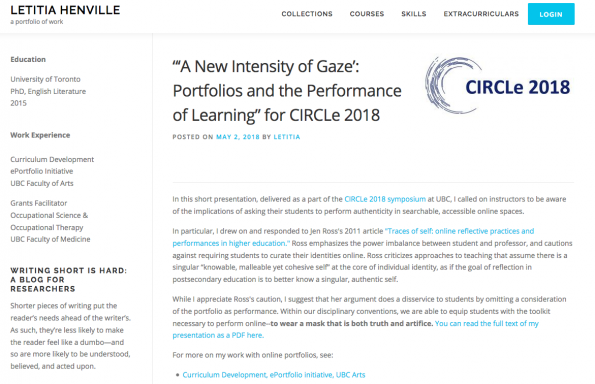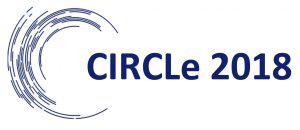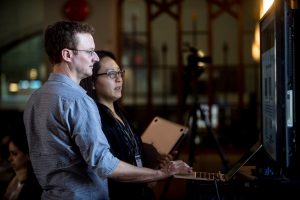CIRCLe 2018 Keynote Address: Dr. Tracy Penny Light, Learning for the Future: ePortfolios Across the Learning Career
9:40 am to 10:30 am
Today’s students come to university to learn with the aim of a career upon graduation. Yet often traditional disciplinary approaches to learning mask the knowledge, skills, and abilities that enable learners to articulate what they know, understand, and are able to do to audiences outside the University, including potential employers. Engaging learners with e-portfolios enables them to make visible their knowledge and to explore ways to transfer learning to a variety of contexts (workplace, academic, community). This talk explores examples of learning designed for future readiness with e-portfolios. Participants will consider how they can enable learners in their contexts to document their abilities, foster lifelong learning and facilitating learning for the future.
Dr. Tracy Penny Light, Associate Professor of History and former Executive Director of the Centre for Student Engagement and Learning Innovation at Thompson Rivers University, is a leading scholar in the field of e-portfolios and learning. Her ongoing educational research focuses on e-portfolios as a pedagogical approach to learner engagement and transformation. Prior to becoming a professor, Tracy worked in areas of faculty development and instructional technologies. In addition to using e-portfolios in her own courses, she has worked with other institutions, faculty and staff to implement e-portfolios. She has co-authored two books on e-portfolios: Electronic Portfolios and Student Success (2010) and Documenting Learning with ePortfolios (2011).
…..
Capturing and Reflecting the Learning Process through ePortfolios
11:00 am to 12:15 pm
Presentations by faculty and students, followed by audience group discussions. This session addresses how learning can be processed and represented using e-portfolios and online platforms. What do online platforms capture that other forms might not? What is problematic about using digital spaces for reflective practices? How can students use e-portfolios in more critical and reflexive ways? How should educators pedagogically distinguish between using e-portfolios as a tool for personal versus professional identity development? What are some best practices for documenting difficult, authentic, and complex learning experiences?
Presentations:
Christine D’Onofrio (Instructor, Department of Art, Visual Art and Theory):
David Gaertner (Instructor, First Nations and Indigenous Studies Program):
Christa Yeung (Student, Geography major):
Letitia Henville (Educational Programmer, Arts Co-op Program):
Christina Hendricks (Professor of Teaching in the Department of Philosophy and Deputy Academic Director of the Centre for Teaching, Learning and Technology at UBC:
…..
Select. Synthesize. Showcase: Capilano University’s ePortfolio Project
12:45 pm to 1:15 pm
Dr. Aurelea Mahood, faculty member in English and Coordinator of the Liberal Studies Program, is project lead on Capilano University’s ePortfolio Project since 2015. Aurelea has extensive experience with program and curriculum development, playing a lead role in developing Capilano’s Bachelor of Arts in Liberal Studies and coordinating that program since its inception in Fall 2011. In this session, she will discuss the pedagogical and technological aspects of implementing an e-portfolio program, including the successes and challenges of building a community of support. Co-presenting with Dr. Mahood will be one of the students from Capilano’s peer mentoring program.
…..
Networking ePortfolios: Integrating Technology with Learning and Connecting to the Real World
1:30 pm to 2:45 pm
Presentations by faculty, students and employers, followed by audience group discussions. This session addresses complex notions of integration and connection in relation to technology, curriculum, pedagogy, and life outside of academia. We will discuss the challenge of bridging the gap between school and the real world, in regards to how e-portfolios are perceived and used. How can educators encourage students to make connections between their academic work and life experiences? How might we better integrate e-portfolios in courses to improve student engagement? What kinds of projects get students to use the technology effectively, both during and after the course? What are the shared overlaps and differences between learning portfolios and career portfolios?
Presentations:
Duncan McHugh (Sessional Instructor, Faculty of Land and Food Systems and Digital Media Specialist in the LFS Learning Centre):
Hugh Knapp (Student, Sociology major):
Thomas Lewis (Technical Evangelism Manager, Microsoft):
…..
Learning through Assessment and the Future of ePortfolios
3:15 pm to 4:30 pm
Presentations by faculty, students and employers, followed by audience group discussions. This session focuses on the following main overarching questions: 1) What might institutional learning cultures (academic, universities, colleges) learn from e-portfolio cultures (professional careers, visual arts, performing arts) regarding approaches to assessment? and, 2) What are best practices for creating ‘folio cultures’ for the future of education? We will discuss ways in which e-portfolios can be used in courses or programs as a tool for assessment. What are the incentives, benefits and challenges for faculty, students and programs to use e-portfolios or personal web spaces? and, What can we do to get more value from these digital tools?
Presentations:
Meghan Aubé (Director, Academic Services, UBC Extended Learning) and Kate Stewart (Program Coordinator, UBC Extended Learning):
Meike Wernicke (Lecturer, Language and Literacy Education, Faculty of Education):
Meike’s presentation contained some screenshots with copyright info so we are unable to provide it here. Please contact her if you would like more information.
Fred Cutler (Associate Professor, Department of Political Science and Director of the Arts Instructional Support and Information Technology):
Tracy Penny Light (Associate Professor of History and former Executive Director of the Center for Student Engagement and Learning Innovation, Thompson Rivers University):
…..


